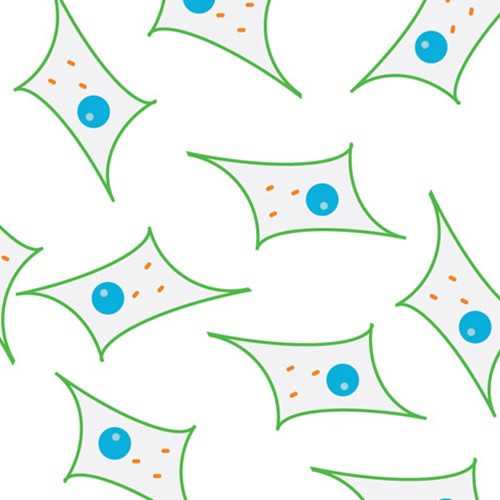TNF Rec KO Macrophage Cell Line
A knockout tumor necrosis factor receptor (TNFR, Tnfrsf1a) macrophage cell line isolated from bone marrow after immortalization with a retrovirus (J2) containing the myc and v-raf oncogenes.
Tumor necrosis factor receptors (TNFRs) are a family of 27 cytokine receptors characterized by the ability to bind tumor necrosis factors (TNFs) via an extracellular cysteine-rich domain. The proteins are similar in structure and activate cell death pathways or induce the expression of genes involved in cellular differentiation and survival. These receptors operate in many organ systems and prominently in the immune system.
From the laboratory of Howard A. Young, PhD, National Cancer Institute/NIH.
A knockout tumor necrosis factor receptor (TNFR, Tnfrsf1a) macrophage cell line isolated from bone marrow after immortalization with a retrovirus (J2) containing the myc and v-raf oncogenes.
Tumor necrosis factor receptors (TNFRs) are a family of 27 cytokine receptors characterized by the ability to bind tumor necrosis factors (TNFs) via an extracellular cysteine-rich domain. The proteins are similar in structure and activate cell death pathways or induce the expression of genes involved in cellular differentiation and survival. These receptors operate in many organ systems and prominently in the immune system.
From the laboratory of Howard A. Young, PhD, National Cancer Institute/NIH.
This product is for sale to Nonprofit customers only. For profit customers, please Contact Us for more information.
| Product Type: | Cell Line |
| Name: | TNF REC (Tnfrsf1a) KO |
| Cell Type: | Macrophage |
| Accession ID: | P01375 |
| Morphology: | Adherent |
| Organism: | Mouse |
| Source: | Bone Marrow |
| Biosafety Level: | BSL2 |
| Growth Conditions: | DMEM + 10% FBS + Glutamine |
| Cryopreservation: | 90% FBS + 10% DMSO |
| Storage: | Liquid Nitrogen |
| Shipped: | Dry Ice |
- Blasi E, Radzioch D, Merletti L, Varesio L. Generation of macrophage cell line from fresh bone marrow cells with a myc/raf recombinant retrovirus. Cancer Biochem Biophys. 1989;10(4):303-317.
- Blasi E, Mathieson BJ, Varesio L, Cleveland JL, Borchert PA, Rapp UR. Selective immortalization of murine macrophages from fresh bone marrow by a raf/myc recombinant murine retrovirus. Nature. 1985;318(6047):667-670.
- Xiao C, Wang RH, Lahusen TJ, et al. Progression of chronic liver inflammation and fibrosis driven by activation of c-JUN signaling in Sirt6 mutant mice. J Biol Chem. 2012;287(50):41903-41913.
If you publish research with this product, please let us know so we can cite your paper.


